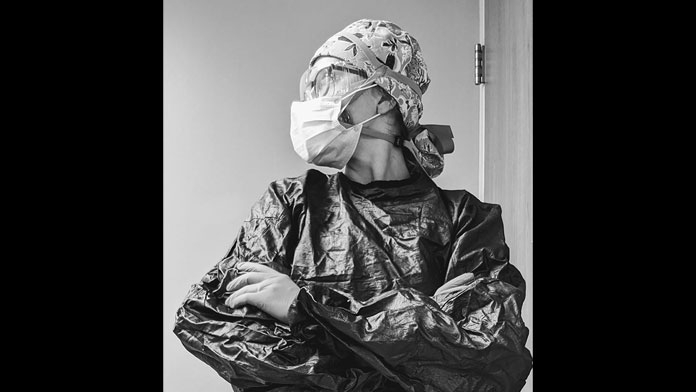
By Mattie Anderson, RN
Nine months ago, we were all taking pictures in our PPE. It was new, it was different. But now here I am, fatigued from putting this on, every single day at work.
I know you’re tired of being asked to wear your mask to stores. But we’re tired too. I’m tired of sweating through my layers of PPE…tired of my foggy goggles… tired of losing my breath after walking across the department from wearing my respirator.
No one goes into the medical field thinking that we’ll be a part of a pandemic.
But here we are.
In the beginning, it was easier. It was our time to shine. Sure there were obstacles. We had never done this before, so things were changing every day, every hour. We adapted, we were figuring it out.
We had so much support. Food, signs, people cheering us on. “Healthcare heroes,” we were called.
What people don’t realize is that most hospitals in the U.S. were facing a sort of epidemic already before COVID came. Many hospitals were already almost completely full of very sick patients. Emergency rooms were boarding inpatient patients for multiple hours. It was tiring, but we were handling it.
But then we were told to prepare for COVID. Setting up tents, postponing elective surgeries, limiting visitors. The elephant in the room: our hospitals are already so full, where are we going to put these patients?
Initially, our patient volume drastically decreased. But the patients we were getting, were so, SO sick. The codes, the intubations, the multiple medications to (try) to stabilize them are burned into my mind. People were scared to leave their homes. We begged people to not wait to be seen when they were having life-threatening symptoms but sometimes it was already too late.
We made it through the first “wave,” but the hospitals’ funding did not.
Hospitals scrambled to save as many jobs as they could, but ultimately jobs were lost.
And then life started to get back to “normal.” Elective surgeries began again, and the states opened back up. It was not long before our patient volumes were back to baseline. But the patients coming in were now even sicker than before. Our hospital started filling up again. Staff continued to work hard with the high volume of high acuity of patients we were getting.
And then the second wave of COVID began.
“Just be conscious of going out, and maybe consider wearing a mask,” we asked of our communities.

But this is where things changed. Instead of believing that we had everyone’s well-being in mind, people took it as us taking a political stance.
And then healthcare workers began to have their integrity questioned. We went from being the most trusted profession, to no one believing a word we were saying.
“How many people ACTUALLY have COVID?”
“How full IS your hospital?”
“The news said ONLY 6% of people with COVID on their death certificate actually died from it.”
“Does your hospital REALLY make money off of COVID?”
These were just some of the questions I was asked by patients, acquaintances, family, and friends. Along with being told “COVID barely affects anyone. But the numbers of suicide and domestic abuse are up!” Trust me people, WE know. Because WE are the ones that take care of them.
And my personal favorite, “What is it ACTUALLY like working right now? How bad is it really?” I find this question absurd. Why would you want to know about my worst days, the shifts I barely made it through, to validate your feelings on how relevant COVID is? It’s like asking a war veteran their worst memory. It’s completely inappropriate.
No, all of our patients in the hospital do not have COVID. We continue to care for all the medical emergencies. We take care of COVID and non-COVID patients. But what people don’t understand is that because of COVID, it has changed processes and how we are able to handle things. What used to be simple tasks, are now tedious and time consuming. Whether we want to believe it, COVID has and continues to significantly affect healthcare in more ways than one.
Now COVID numbers are going up again, but healthcare worker numbers are going down. We’re losing our adrenaline, we’re getting tired.
I’m grateful for co-workers that still show up after rough days, weeks, and now months. For the hugs, laughs, and vent sessions to get us through. For their willingness to take on bigger patient loads, and become innovative on how we can see as many patients as possible, even if it means leaving work with no energy left. I’m grateful for management that sees we’re getting weary, but still do their best to support us, even when their hands are tied.
We are trying our best, but I’m not sure if that is good enough anymore. We’re so tired. But the fuller the hospital gets, the more impatient people get, the more we have to “prove” ourselves and what we can handle.
We can be overworked and understaffed. But ultimately, it’s you, your loved ones, your friends, that suffer. Not because we don’t want to provide good care, but because we physically can’t.
If you have not stepped foot in a hospital since this pandemic started, you do not get an opinion on what you **think** is happening inside our walls.
I truly believe that right now healthcare workers are in survival mode. We are doing what we have to do to take care of everyone else. But I fear that soon, healthcare workers are going to burn out, and are going to leave. Not because they’re giving up, but because they have completely given all of themselves for months and they have nothing left. I worry about the trauma medical staff have seen; it’s not normal to see this much death. I fear for the mental health of my peers; how do you debrief from months of this? Who’s going to take care of those that take care of others?
The election is over, and COVID is only getting worse, not just “Going away.” It is our job as citizens of this country to help each other out, not just stand back and criticize because it is not currently affecting you.
You are privileged if you can choose to just be “over” COVID because you’re tired of it. Some people don’t get that luxury, and instead have faced it every single day for the last eight months.
And lastly, just know, people are watching and listening to everything you share and say. The amount of people that I still see saying “only X people have died from COVID,” is seriously disgusting. The very LEAST we can do as a country is have a little empathy for the friends and family that have lost loved ones to COVID. Stop being insensitive and making the hundreds of thousands of lives lost seem so insignificant to you. Stop talking about how much wearing a mask for 15 minutes inconveniences you and takes away your rights as a human, when your neighbor next door would give anything to wear full PPE to have the chance to be with their COVID+ family member in the hospital.
I understand everyone is fighting their own battles right now, and I don’t discredit that. We all wish things could go back to how they were before COVID. But this isn’t a competition on who has it worse. This is a pandemic that is causing MANY struggles and we need to come together as a country. Now is the time to choose to think of others’ situations, and not just your own. At the bare minimum, be a kind human being.
If this is triggering negative emotions in you, I strongly believe you need to take a closer look at your heart. Stop politicizing COVID, stop calling it the flu, and for the love of God, stop saying COVID is a hoax. Be a part of the solution, not the problem.
Editor’s note: This came in as a letter to the editor from a nurse in Texas. We are publishing it here to demonstrate what some in the nursing field are experiencing even though it is not local. Local medical professionals have shared similar stories with staff of this newspaper but only off the record.






